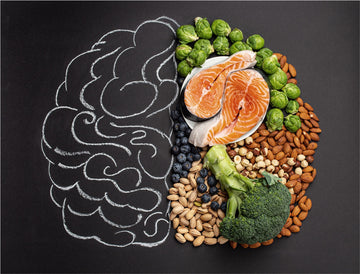Our brain is the center of our thoughts, actions, and feelings. It processes countless pieces of information, controls our movements, and enables us to complete complex tasks. But just as our body benefits from proper nutrition, our brain also needs a constant supply of energy and nutrients to optimally perform all of these functions. With the right foods—so-called "brain food"—you can not only keep your brain functioning at its best, but also help it think faster, concentrate better, and recover more quickly from stressful periods.
In this article, you will learn which nutrients are particularly important and which foods best support your brain in order to specifically compensate for possible deficiencies.
Why nutrients are so important for the brain
The brain is a true energy miracle. Although it only accounts for about 2% of our body weight, it consumes up to 25% of our daily energy. It works around the clock, even while we sleep, and relies on a constant supply of nutrients to maintain all its functions. Certain vitamins, minerals, fatty acids, and antioxidants are particularly important for the brain to think clearly, concentrate well, and respond calmly to stress. A lack of these nutrients often leads to feelings of fatigue, lack of concentration, or even long-term memory problems.
The most important nutrients for your brain
Our brain controls our thoughts, movements, emotions, and many unconscious processes such as breathing and heart rate. To maintain these functions, the brain requires a continuous supply of nutrients. These nutrients not only help promote daily performance but also protect the brain from long-term damage and support mental health.
To keep everything running smoothly, you need a good dose of important nutrients every day. These not only boost your mental energy in everyday life, but also help keep your brain healthy and efficient in the long term. Here are the nutrients your brain needs most.
1. Omega-3 fatty acids
Omega-3 fatty acids, especially DHA (docosahexaenoic acid), are essential for the structure and function of brain cells. DHA is a major component of cell membranes in the brain and plays a central role in signal transmission between nerve cells. Omega-3 fatty acids have anti-inflammatory properties, and studies1 suggest that they may contribute to reducing the risk of neurodegenerative diseases such as Alzheimer's. However, this hypothesis has not yet been conclusively researched.
Natural sources:
- Fatty fish such as salmon, mackerel, herring and sardines
- Walnuts
- chia seeds
- linseed
2. B vitamins (B6, B12, folic acid)
The B vitamins are essential for many brain functions. They play a key role in energy metabolism and support the production of neurotransmitters such as serotonin, dopamine, and GABA, which are responsible for mood and drive. Vitamin B12 and folic acid, in particular, are essential for nerve cell health and the formation of myelin, a protective covering for nerve fibers.
Vitamin B6 + Vitamin B12 2 ...
- contribute to the normal function of the nervous system
- contribute to normal psychological function
- contribute to the reduction of tiredness and fatigue
Natural sources:
- Meat (especially liver)
- eggs
- legumes
- leafy vegetables
- Whole grain products
3. Antioxidants (vitamin C, vitamin E)
Antioxidants such as vitamin C and vitamin E play a crucial role in protecting the brain from oxidative stress. Oxidative stress occurs when free radicals damage cells in the brain, which can lead to inflammation and accelerate the aging process. Antioxidants neutralize these free radicals, helping to keep the brain healthy and protect against neurodegenerative diseases.
Vitamin C 2 ...
- contributes to the normal function of the nervous system
- contributes to normal psychological function contributes to the normal function of the immune system
- contributes to the protection of cells from oxidative stress
- contributes to the reduction of tiredness and fatigue
Natural sources:
- Citrus fruits (vitamin C)
- Nuts and seeds (vitamin E)
- berries
- broccoli
- paprika
4. Magnesium
Magnesium is a mineral involved in over 300 biochemical reactions in the body, including the regulation of the nervous system. It helps support communication between nerve cells and plays an important role in regulating brain activity, particularly in stress management and improving sleep. A magnesium deficiency can lead to nervousness, difficulty concentrating, and headaches.
Official Health Claims 2 include:
Magnesium 2 ...
- contributes to the reduction of tiredness and fatigue
- contributes to the normal function of the nervous system
- contributes to normal psychological function
Natural sources:
- Green leafy vegetables
- nuts and seeds
- Whole grain products
- avocados
5. Choline
Choline is a lesser-known but extremely important nutrient for brain function. It is required for the production of acetylcholine, a neurotransmitter involved in memory and learning processes. Choline also plays a role in the construction and maintenance of cell membranes in the brain. A choline deficiency can lead to memory impairment and poorer cognitive performance.
Natural sources:
- eggs
- liver
- broccoli
- Peanuts
6. Zinc
Zinc is a mineral that plays a key role in neurotransmission and signal processing in the brain. It supports communication between nerve cells and is necessary for the proper function of enzymes involved in brain metabolism. Zinc deficiency has been linked to depression, cognitive impairment, and memory problems. According to authorized health claims from the European Commission2, zinc contributes to normal cognitive function.
Zinc 2 ...
- contributes to normal cognitive function
Natural sources:
- beef
- pumpkin seeds
- chickpeas
- lenses
7. Iron
Iron is crucial for the oxygen supply to the brain. It plays an important role in energy production in brain cells and is particularly important for memory and concentration. Iron deficiency can lead to fatigue, difficulty concentrating, and reduced cognitive performance. Studies show that people with iron deficiency often suffer from fatigue and cognitive impairment, while adequate iron intake improves mental performance.
Iron 2 ...
- contributes to the normal cognitive development of children
- contributes to normal cognitive function contributes to normal energy metabolism
- contributes to normal oxygen transport in the body
- contributes to the reduction of tiredness and fatigue
Natural sources:
- Red meat
- legumes
- spinach
- tofu
8. Coenzyme Q10
Coenzyme Q10 is a powerful antioxidant found in the mitochondria, the "powerhouses" of cells. It supports energy production in the brain and protects brain cells from oxidative stress. Coenzyme Q10 is particularly useful during times of mental overload and exhaustion.
Natural sources:
- Meat
- Fish
- nuts
- spinach
Some of the best natural sources of these nutrients can be found in certain foods often referred to as "brain foods." They provide exactly the nutrients your brain needs to function at peak performance. Let's take a closer look at these power foods.
The best brain foods for your mental performance
1. Nuts – The perfect snack for your brain
Nuts are a true nutritional powerhouse. They're rich in healthy fats, vitamins, minerals, and antioxidants that protect the brain and support its functions. Of particular note is their high content of vitamin E, which plays an important role in protecting brain cells from oxidative stress. Oxidative stress is caused by free radicals, which can attack brain cells and contribute to age-related cognitive decline.
One particular type of nut that is particularly beneficial for brain function is walnuts. They contain not only vitamin E but also omega-3 fatty acids, which are essential for the structural integrity of brain cells. Omega-3 fatty acids are components of cell membranes and support signal transmission between nerve cells.
Tip: A handful of walnuts or almonds a day can help support brain function while strengthening your cardiovascular system. They're a great snack between meals or as a topping on your muesli or yogurt.
2. Berries – Small but full of antioxidants
Berries, especially blueberries, are not only delicious but also incredibly rich in antioxidants that protect the brain from oxidative stress. Oxidative stress is one of the main causes of age-related cognitive decline because it can damage brain cells.
Another benefit of berries is their high content of vitamin C, which is also a powerful antioxidant and supports the immune system. Vitamin C not only helps fight off free radicals but also promotes the production of neurotransmitters, which are necessary for communication between nerve cells.
Tip: Include berries in your breakfast, whether in a smoothie, sprinkled over yogurt, or simply as a snack. Not only do they help your brain, but they also provide a good dose of vitamin C and are low in calories.
3. Fatty fish – Omega-3 for sharp thinking
Fatty fish such as salmon, mackerel, herring, and sardines are the best natural sources of omega-3 fatty acids, which the brain urgently needs. Omega-3 fatty acids, especially DHA, are essential for maintaining the structure of brain cells and play a crucial role in brain signal transmission.
Omega-3 fatty acids also have anti-inflammatory effects and may help reduce the risk of neurodegenerative diseases such as Alzheimer's. DHA is particularly important for memory and cognitive performance because it is found in high concentrations in the gray matter of the brain, where information processing takes place.
Studies show that people who regularly eat fatty fish have better cognitive abilities and are at lower risk of memory loss and cognitive impairment as they age.
Tip: Try to eat fatty fish at least twice a week to provide your brain with the omega-3 fatty acids it needs. If you don't like fish, plant-based sources or omega-3 supplements can be a good alternative.
Vegan Omega-3 Alternatives: Plant-Based Sources for Mental Sharpness
Omega-3 fatty acids are essential for brain health and mental performance, but fish isn't the only source of these valuable fats. Vegan sources offer an effective alternative for supplying the brain with alpha-linolenic acid (ALA), an omega-3 fatty acid that the body can convert into the important docosahexaenoic acid (DHA) and eicosapentaenoic acid (EPA)—both key components for brain function.
The main sources of plant-based omega-3 are flaxseed, chia seeds, hemp seeds, and walnuts. One tablespoon of flaxseed or chia seeds provides a significant portion of the daily ALA requirement. Algal oils also provide a direct source of DHA and EPA and are particularly effective for vegans. Studies show that algal oil can have similar effects to fish oil, making it an excellent alternative.
For optimal absorption, omega-3-rich foods should be regularly incorporated into the diet to support long-term cognitive health and promote mental acuity.
4. Eggs – The nutrient bomb for your brain
Eggs are not only an excellent source of protein, but also an excellent source of choline, a nutrient needed for the production of acetylcholine – a neurotransmitter involved in memory and learning.
In addition, eggs contain vitamin B12, which is particularly important for nerve function and brain health.
Tip: Include eggs regularly in your diet, whether for breakfast, in an omelet, or in salads. They're versatile and provide a variety of important nutrients that benefit your brain.
5. Pulses - A real brain food for more focus and energy
Pulses such as lentils, beans, chickpeas, and peas are not only a great source of protein, but also rich in important brain-supporting nutrients. They contain high levels of folate, iron, magnesium, and zinc, which together help promote cognitive function and memory. Iron and zinc deficiencies can also lead to fatigue and difficulty concentrating.
Particularly beneficial is the slow breakdown of complex carbohydrates in legumes, which ensures a stable energy supply and prevents blood sugar spikes. This supports long-term concentration and prevents fatigue from quickly becoming tired after a meal. Additionally, the fiber in legumes contributes to intestinal health, which can also have a positive effect on the brain, as the gut is closely connected to the brain via the so-called gut-brain axis.
Compensating for nutrient deficiencies: How the NN Brainrefresher® supports your brain
While it's important to regularly incorporate these "brain foods" into your diet, it can still be difficult to always meet your full nutritional needs. This is precisely where NN Brainrefresher® can provide valuable support. This specially developed formula provides your brain with a carefully balanced combination of vitamins, minerals, and antioxidants to promote mental performance and specifically compensate for nutrient deficiencies.
What makes the NN Brainrefresher® so special?
-
B vitamins: NN Brainrefresher® contains a combination of important B vitamins such as B6, B12, and B2. As described above, these vitamins are essential for the brain's energy metabolism, as they help convert carbohydrates into energy and reduce fatigue.
-
Magnesium and zinc: These two minerals help promote brain resilience during stressful times and are included in NN Brainrefresher® to ensure your brain is always optimally supplied.
-
Antioxidants: Antioxidants such as vitamin C and vitamin E protect the brain from the harmful effects of free radicals.
-
Coenzyme Q10: Coenzyme Q10 is a powerful antioxidant that supports cellular energy metabolism.
-
Cordyceps: The Cordyceps mushroom is a traditional adaptogen that has been used in Chinese medicine for centuries to enhance physical and mental performance. Adaptogens can help the body adapt better to stress and support the nervous system in challenging situations. In NN Brainrefresher®, Cordyceps helps promote brain resilience and stabilize energy levels naturally—without the use of caffeine.
When is the NN Brainrefresher® particularly useful?
The NN Brainrefresher® is an ideal supplement for anyone who regularly faces high mental demands or wants to maintain their concentration and mental performance during stressful periods. Whether you're taking exams, under professional pressure, or simply feel like your brain needs support, the NN Brainrefresher® provides the nutrients your brain needs to perform at its best.
It's especially helpful during periods when you feel like your diet alone isn't enough to provide you with all the essential nutrients. Since the NN Brainrefresher® is caffeine-free, you also avoid unpleasant side effects like nervousness or sleep disturbances that often accompany caffeine-containing products.
Conclusion: Brain food and targeted supplements for a powerful brain
Your brain works for you around the clock – processing information, making decisions, and keeping you clear-headed during stressful times. To perform all of these tasks at its best, however, it needs the right nutrients. With a balanced diet rich in "brain food" such as nuts, berries, fatty fish, eggs, and legumes, you can optimally support your brain and maintain its performance.
And if your diet is not enough to meet the increasing demands of everyday life, the NN Brainrefresher® With its targeted combination of vitamins, minerals and antioxidants, it is a great alternative.
Remember: Your brain is constantly working at full speed for you – it deserves a little extra love so that it can continue to diligently craft your brilliant ideas!
Sources:
1 Giacobbe J.; Benoiton B.; Zunszain P.; Pariant CM; Borsini A. (2020): The Anti-Inflammatory Role of Omega-3 Polyunsaturated Fatty Acids Metabolites in Pre-Clinical Models of Psychiatric, Neurodegenerative, and Neurological Disorders. Frontiers in Psychiatry. Volume 11.
2 European Commission (2024): Health Claims. Food and Feed Information Portal Database. https://ec.europa.eu/food/food-feed-portal/screen/health-claims/eu-register












